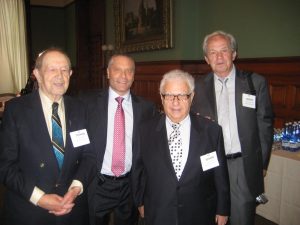Library and Archives Canada (LAC) announced on Jan. 23 that it had purchased a book that Adolf Hitler had commissioned about Jewish communities in Canada and the United States. LAC bought the item from a Judaica book dealer in June for around $6,000. The federal agency waited until now to announce the purchase, because conservators have spent the intervening months restoring it.
The 137-page book, published in 1944, is called Statistik, Presse und Organisationen des Judentums in den Vereinigten Staaten und Kanada, which translates to Statistics, Media and Organizations of Jewry in the United States and Canada. It details the populations of various communities, as well as their Jewish institutions. And not just large metropolises, but even small towns with Jewish communities of only a few families.
“Had the Nazis won World War II and taken administrative control of North America, they would have of course rolled out the Final Solution in Canada, and a report like this would have let them know what cities to go to to find Jewish populations and how many Jews would be in those cities,” said Michael Kent, curator of the Jacob M. Lowy Collection of rare Judaica at LAC.
Jack Granatstein, a historian and retired professor who was the head of the Canadian War Museum from 1998 to 2000, noted the unusual time that the book was published – 1944, when the Nazis must have known they had no hope of conquering North America. He thinks its possible that the Nazis wanted to target cities that had heavy Jewish populations with anti-Semitic propaganda to stir up racial hatred in North America.
“It suggests that their focus was a little bit misdirected, when they should have been thinking of how best to survive, that they were still gathering this kind of information,” he said.
The author of the book, Heinz Kloss, worked for a research organization that designed and produced information for the Nazi regime, said Kent. He had worked as a researcher in North America before the war broke out, where he made connections with Nazi sympathizers. Kloss likely called upon those connections to write the book, but he also cited more traditional sources, including Canada’s 1931 census.
Kent said that LAC initially debated whether it was appropriate to purchase a book that had been commissioned and owned by Hitler. LAC reached out to Jewish organizations for their perspective and most of them told the agency it should go ahead with the purchase.
The thought process behind buying such a book is twofold, according to Kent. The first was simple: LAC’s goal is to acquire every Canadian book. That means every book written in Canada, about Canada or by a Canadian, which so far has led to a collection of over 22 million books. But for a book with as fraught a history as this one, there’s more to consider, such as what value there is in purchasing it.
READ – MORE THAN HALF OF CANADIANS DON’T KNOW SIX MILLION JEWS DIED IN HOLOCAUST: POLL
“As a memory institution, we need to play an essential role, especially (at) a time when Holocaust denial is on the rise, awareness about the Holocaust is on the decline, xenophobia is on the rise,” said Kent. “Now more than ever, memory institutions such as ours need to take active steps towards preserving the memory of the Holocaust.”
The book was Hitler’s personal property, as evidenced by the bookplate featuring an eagle, swastika and the words, “EX LIBRIS ADOLF HITLER.” Kent said that when the American military captured Hitler’s private villa, many took books as war souvenirs, which is likely how this one ended up in North America.
“This item shows us that while the Holocaust is an event that happened in Europe, had the war gone differently, the Holocaust was an event that (could have) spread around the world,” said Kent. “I think this book reminds us that conflicts and human tragedies that seem far away can actually come to Canadian soil.”
“This chilling document proves that the Nazis had terrifying global ambitions for the Holocaust,” said Martin Sampson of the Centre for Israel and Jewish Affairs over email. “We will use it as a tool to combat one of the most insidious and preposterous forms of anti-Semitism: Holocaust denial.”
The book will be on public display at Library and Archives Canada in Ottawa on Jan. 27, as part of an event commemorating International Holocaust Remembrance Day. Kent said the plan is to digitize parts of the book and upload them online for public viewing.






